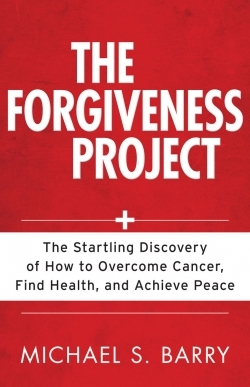The Forgiveness Project
The Startling Discovery of How to Overcome Cancer, Find Health, and Achieve Peace
- 2010 INDIES Finalist
- Finalist, Body, Mind & Spirit (Adult Nonfiction)
The medical world has long accepted the connection between the survival rates of cancer patients and their emotional outlook; support groups and therapy have been an integral part of treatment plans for decades. Michael Barry, the Director of Pastoral Care for the Cancer Treatment Centers of America and author of several books about faith and healing, argues that failing to forgive others for past injuries or mistreatment can tax the immune system and increase one’s vulnerability to cancer. Barry does not claim that anger causes cancer, but he argues persuasively that purging old resentments—“a little ugliness in the deep recesses of my heart”—frees up psychic energy that patients might not otherwise have, increasing their remission and survival rates.
Participants in “The Forgiveness Project” write journal entries that challenge them to “put a human face” on their adversaries. This “narrative therapy,” accompanied by counseling and prayer, allows writers to articulate their rage, enacting on paper confrontations they either lost or wish they could have had. Long-nurtured hatred often stems from a sense of powerlessness, and the journal entries prompt patients to explore the nuanced, deep-seated issues they may have carried for years.
One woman defused her hatred of the men who had kidnapped and held her husband hostage by imagining his abductors as children whose lives were difficult enough to drive them to such desperate behavior. A man who worked with a verbally-abusive relative for decades realized that he had contributed to his own stress by perpetually dwelling on the indignities he suffered in conversation with friends and family. Both patients were able to forgive, achieving the “peaceful indifference” to which Barry attributes the remission of their cancer. Hatred is characterized as a toxic emotion, and truly releasing it from one’s emotional landscape profoundly liberating, often characterized by Barry’s patients as a feeling of “lightness.”
Forgiveness is a difficult process because some injuries are not forgivable. Barry’s faith-based program is an extension of his Christian ministry, but his techniques are accessible to those of other faiths. He makes frequent references to faith and God, and he quotes from Muslim writings as well as from the Old and New Testament. Readers of all backgrounds will find many reflections of themselves on the pages of this thoughtful book.
Reviewed by
Elizabeth Breau
Disclosure: This article is not an endorsement, but a review. The publisher of this book provided free copies of the book to have their book reviewed by a professional reviewer. No fee was paid by the publisher for this review. Foreword Reviews only recommends books that we love. Foreword Magazine, Inc. is disclosing this in accordance with the Federal Trade Commission’s 16 CFR, Part 255.

